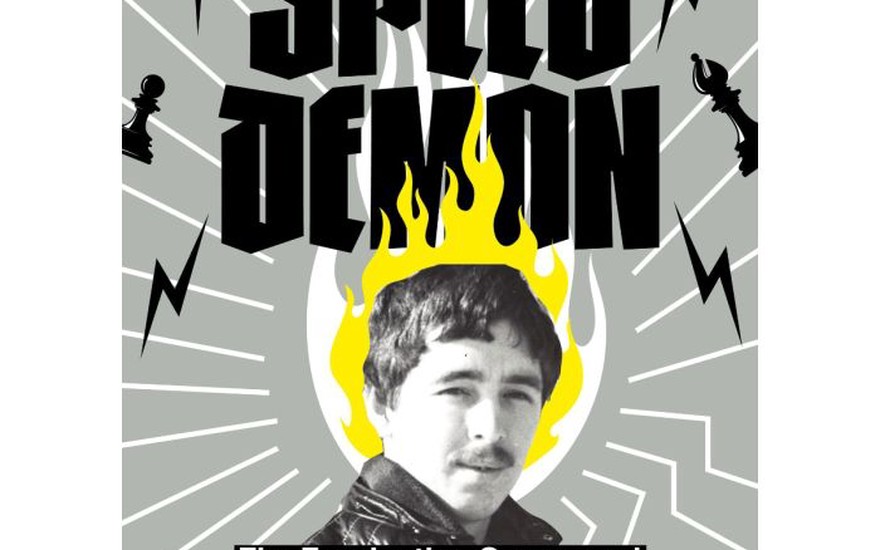
Review: Alexey Vyzhmanavin by Dmitry Kryakvin
This is a review by FM James Vigus of Speed Demon: The Fascinating Games and Tragic Life of Chess Grandmaster Alexey Vyzhmanavin, by Dmitry KryakvinSpeed Demon: The Fascinating Games and Tragic Life of Chess Grandmaster Alexey Vyzhmanavin
by Dmitry Kryakvin
New in Chess 2023, 197 pages, paperback
Sample pages available on the publisher's website
The author of this book is a Russian grandmaster, as was its subject, Alexey Vyzhmanavin. Vyzhmanavin played for the Russian Olympiad team and became one of the strongest players in the world in the early 1990s, shining especially at blitz and rapid. Back in the days of televised chess I remember watching him play in PCA (Professional Chess Association) speed events - a memory revived by one of the photographs featured in this book. Sadly, he died in 2000 at the age of just 40.
New in Chess deserve credit for publishing this book on a player who is otherwise no longer very widely remembered. Unlike opening repertoires or books on world champions, its market may be relatively limited. Purchasers will not be disappointed, however. It contains sparkling games and a fascinating, if harrowing, life story. A comprehensive-looking table of tournament results rounds off the book.
Vyzhmanavin was largely self-taught and suffered with family problems from an early stage: despite a well-paid job, which he eventually lost, his father was a severe alcoholic and a gambler. It was to be exactly the same combination of weaknesses that would bring Alexey's life to a premature end.
Kryakvin begins with an atmospheric description of Sokolniki Park, where Vyzhmanavin played much of his early chess. We then see his first major successes: an impressive defeat of Bronstein with the Veresov (1 d4 Nf6 2 Nc3 d5 3 Bg5). Vyzhmanavin liked to get off the beaten track in the opening, and he was a ferocious attacker and tactician. The next victims (games 2 and 3) are Psakhis and Vaganian; subsequently, we witness Ivanchuk, Beliavsky, Kupreichik, Korchnoi and other famous names being crushed in fine style.
Kryakvin has drawn on Vyzhmanavin's own notes in some cases and of course used computer engines for the annotations, which are readable and clear. Questions are often inserted following diagrams to enable us to test our tactical skill - a very nice feature. Many of the 70 games are presented as fragments. This won't be to every reader's taste, but it allows the author to focus on the important phase.
Game selections can always be debated. Why wasn't this wonderful win against Ehlvest from 1984 included, I wonder?
https://tartajubow.blogspot.com/2023/01/a-storm-over-blacks-king.html
Vyhzmanavin suffered a high-profile lapse in 1994 in an 'armageddon' game against Kramnik: in a totally winning position he agreed a draw, wrongly supposing that this enabled him to qualify for the final.
Kryakvin has evidently researched his subject thoroughly. His major scoop is an extensive interview with Vyhzmanavin's ex-wife, Lyudmila. The most interesting and revealing parts of the narrative are told in her words, through which we glimpse the emotional highs and lows of the grandmaster's successes, alcoholic crashes and overspending. At times I wished for a little more social context from the author. For instance, Lyudmila says of 1993, 'everything was falling apart: the country, medicine, the entire healthcare system' (p. 159), making it harder than ever to seek help. I imagine I won't be the only reader to lack detailed knowledge of what was taking place in Russia at that time. Still, the story is certainly vivid enough. It is written, concludes Kryakvin, 'chiefly so that nobody...ever repeats Alexey Vyhzmanavin's tragic fate' (p. 188).
More blog posts by Minckwitz

Review: Max Euwe's Best Games by Jan Timman
Games of lesser-studied world champions part 1
Review: The Perfect Pirc-Modern by Viktor Moskalenko
This is a review by FM James Vigus of Moskalenko's The Perfect Pirc-Modern
Review: Some instructional and training works
Review by FM James Vigus of recent training/calculation books